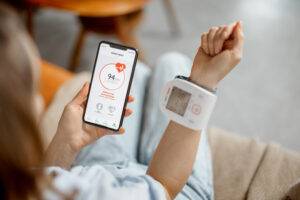BackgroundModerate-to-vigorous physical activity (MVPA) and depression symptoms have a longstanding, inverse relationship. This short-term study examined the patterns of MVPA and prevalence of depression symptoms among adults seeking care from an employer-sponsored, multi-modal digital mental health platform.MethodsAdults (n = 755) with access to the platform enrolled in an online, observational study over 3 months. Baseline and longitudinal analyses were conducted on self-report MVPA and depression symptoms. Rates of activity and symptom improvement and maintenance were evaluated.ResultsApproximately 47% of participants were physically underactive at baseline, defined as <150 min of physical activity per week. Men participated in more physical activity than women (p = 0.005), while women and individuals identifying as gender non-binary reported more depression symptoms than men (ps < 0.05). Older adults reported fewer depression symptoms than younger adults (r = −0.16, p < 0.001). Baseline MVPA baseline was negatively correlated with depression symptoms (r = −0.19, p < 0.001). Depression scores significantly improved, with 66.9% of adults at risk of depression improving or recovering (p < 0.001) and 94% of adults with low depression symptoms maintaining this status over time (p = 0.004). Physical activity participation improved by 217% among individuals deemed underactive at baseline (p < 0.001), while individuals who were active at baseline maintained high levels of physical activity (p = 0.06).ConclusionsAdults with access to a multi-modal digital mental health platform reported significant beneficial changes in depression symptoms and physical activity participation. Digital mental health tools may have the potential to elicit positive change in physical health domains, as well as mental health.
Artificial intelligence in healthcare: applications, challenges, and future directions. A narrative review informed by international, multidisciplinary expertise
ObjectivesThis narrative review evaluates the role of artificial intelligence (AI) in healthcare, summarizing its historical evolution, current applications across medical and surgical specialties, and implications



